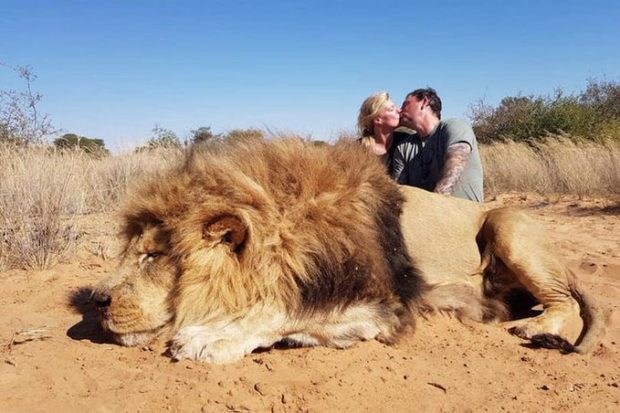
The two hunters have married a familiar display of personal affection to their brazen and remorseless killing of an animal whose lifeless body lies before them. It’s not romantic to the rest of us; it’s crass and clueless, and horrifying.
The latest controversy surrounding lurid social media posts by trophy hunters has prompted a predictable response — global outrage and a wave of tweet storms directed at the individuals involved. This time around, it’s a Canadian couple who posed for a kiss over the dead captive lion they’d just killed in South Africa.
Those of us who spend our days trying to preserve and safeguard the world’s dwindling populations of endangered and threatened animals, and to prevent their slaughter, are accustomed to the grim details of trophy hunting and to the terrible toll it takes on healthy, beautiful and extraordinary animals. Even so, such photos are appalling to us.
In this instance, the two hunters have married a familiar display of personal affection to their brazen and remorseless killing of an animal whose lifeless body lies before them. It’s not romantic to the rest of us; it’s crass and clueless, and horrifying.
And worse yet, media reports suggest that the lion had been bred in captivity and confined in a small enclosure at a canned hunt facility – enterprises that profit off the exploitation of innocent animals from cradle to grave.
The outrage is palpable and rightly so, but targeting the couple will not solve the problem. We need to use such moments to highlight the many channels through which we can all work together to bring trophy hunting to an end.
The Humane Society of the United States and Humane Society International are aggressively publicizing the destructive impact of trophy hunting, stateside and worldwide. We’re lobbying and litigating to stop it in legislatures, treaty organizations and courts. We’re working to give communities living alongside wildlife the non-lethal tools needed to promote coexistence, and to encourage wildlife watching and photographic tourism as a much more substantial, sustainable and viable alternative to trophy hunting in the long term. We’re pressing airlines not to transport the skins and body parts taken as trophies. And we’re building a global community committed to the methodical, steady and certain dismantling of the trophy hunting industry worldwide.
In Canada, where the couple’s photograph and actions have angered countless citizens, we are fighting for laws to end trophy hunting. Canada is a major destination for international trophy hunters, but polls show that four out of five Canadians support legislation to ban all trophy hunting. HSI Canada has been campaigning for legislation to do so, and has played a central role in achieving corporate policies prohibiting the transport of wildlife trophies. Within Canada, we have been successful in helping to secure a ban on spear hunting in Alberta and a ban on grizzly hunting in British Columbia.
Stateside, the Humane Society Legislative Fund is supporting legislation to address the role that wealthy Americans play in sustaining trophy hunting, including canned hunting enterprises in African countries. The Conserving Ecosystems by Ceasing the Importation of Large Animal Trophies (CECIL) Act, introduced in Congress by House Natural Resources Committee Chairman Raul Grijalva, D-Ariz., would substantially restrict the import and export of trophies of any species listed or proposed to be listed as threatened or endangered under the Endangered Species Act (ESA) and prohibit the import of elephant and lion trophies from Zimbabwe, Zambia and Tanzania.
In coming days, we expect the Prohibiting Threatened and Endangered Creature Trophies (ProTECT) Act to be introduced in Congress. This bill would prohibit trophy hunting of ESA-listed species in the United States and the import of any trophy of a species listed under the ESA, thereby crippling the trophy hunting industry here at home and globally.
Individuals who think it’s just fine to kill and dishonor threatened and endangered species without compunction are Exhibit A in the case against trophy hunting. But they should not be our personal target. We need to seize these moments and channel this wave of opposition by working together to create an atmosphere of zero tolerance for trophy hunting. We need to strengthen every law and regulation to end this so-called “sport” that severely disrupts animal populations worldwide.
Please take a moment to call your federal lawmakers today and ask them to support the CECIL Act in Congress so we can bring to an end the role our nation plays in this craven activity.
The post Couple kissing next to lion they killed spark global outrage, highlighting urgency for ending trophy hunting appeared first on A Humane World.
Enviroshop is maintained by dedicated NetSys Interactive Inc. owners & employees who generously contribute their time to maintenance & editing, web design, custom programming, & website hosting for Enviroshop.
